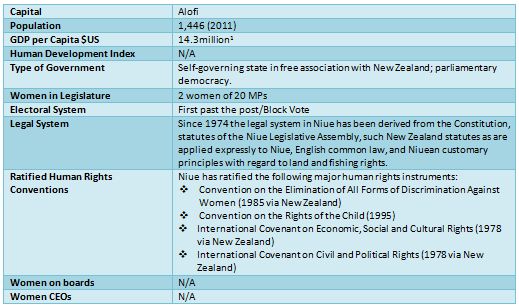Niue

Niue, commonly known as the “Rock of Polynesia”, is one of the world’s smallest island countries. Located in the south West Pacific Ocean, Niue is the largest and highest coral atoll in the world. Due to its relative isolation and geographic make up – a raised atoll – Niue depends heavily on imports and foreign aid[1]. Niue is a self-governing state and has been in free association with New Zealand since 1974[1].
Women and the Law
Niue recognises no contextual or aggravating factors in its sexual offence legislation.
Violence Against Women
Violence against women and girls is believed to be widespread, at a community level, however, there is an absence of reliable data indicating its prevalence. Anecdotal evidence about the community response to gender-based violence in Niue shows that domestic violence tends to be managed within the extended family and village[1].
Women form 76% of the non-agricultural workforce and perform 84.4% of household duties. Approximately 38% of households in the lowest income quintile are female-headed.
Women’s Health
About 46% of Niuean women are classified as obese, and 11% suffer from diabetes and hypertension. Niue’s maternal mortality rate was 0 in 2006, and 99% of recorded births were attended by skilled birth attendants. Niue’s contraceptive prevalence rate was 23% in 2001. The adolescent birth rate increased markedly in the period of 1994 to 2004 rising from 35 to 53 per 1,000 women.
Annual and seasonal maximum and minimum temperatures at Hanan Airport have increased at a rate of 0.15°C per decade since 1950. These temperature increases are consistent with the general pattern of global warming. Satellite data indicate the sea level has risen near Niue by about 5mm a year since 1993. This is larger than the global average of 2.8-3.6mm per year, which may be partly related to natural fluctuations caused by phenomena such as the El Nino Southern Oscillation. Data show that since the 18th century the level of ocean acidification in Niue’s waters has been slowly increasing.
UN Women in Niue
Advancing Gender Justice in the Pacific (AGJP) Programme: UN Women continues to support advocacy initiatives that promote women’s political participation and provide knowledge products on the Convention on the Elimination of all forms of Discrimination Against Women (CEDAW) and harmonised human rights treaty reporting.
Ending Violence against Women (EVAW) Programme: This programme provides stakeholders with access to virtual knowledge platforms, tools and evidence-based resources in order to better equip them with the knowledge and evidence to advocate for strengthened EVAW legislation, improved policies and services for violence against women survivors. Social media tools are also made available to support community mobilisation aimed at ending violence against women and girls, through campaigns such as the United Nations Secretary General’s UNiTE to EVAW and Say NO-UNiTE.
Women’s Economic Empowerment (WEE) Programme: UN Women is supporting informed and evidence-based decision-making when it comes to gender issues by assisting in the production of nationally-generated disaggregated data and statistics on the economic situation of women.
Increasing Community Resilience through Empowerment of Women to Address Climate Change and Natural Hazards (IREACH) Programme: UN Women supports the incorporation of gender dimensions in strategic documents for disaster risk management and climate change through the provision of knowledge products and tools on the gendered implications of climate change and disasters.
[1] UNDAF country assessment